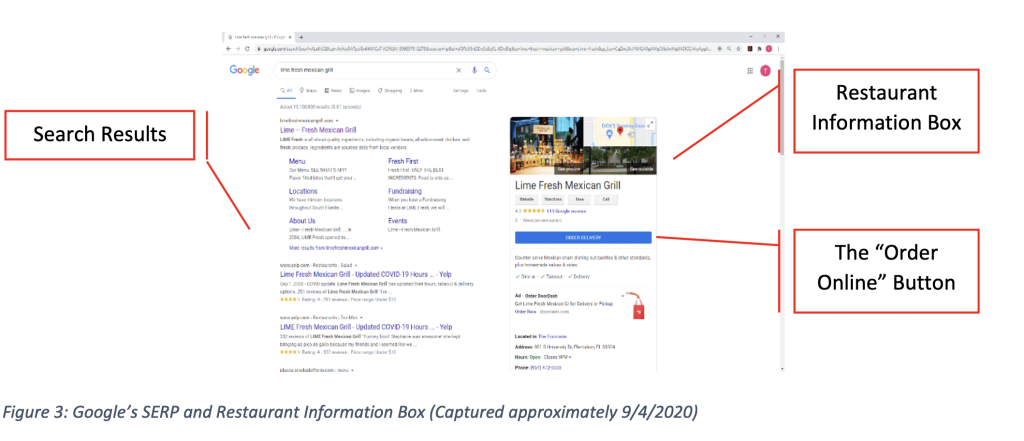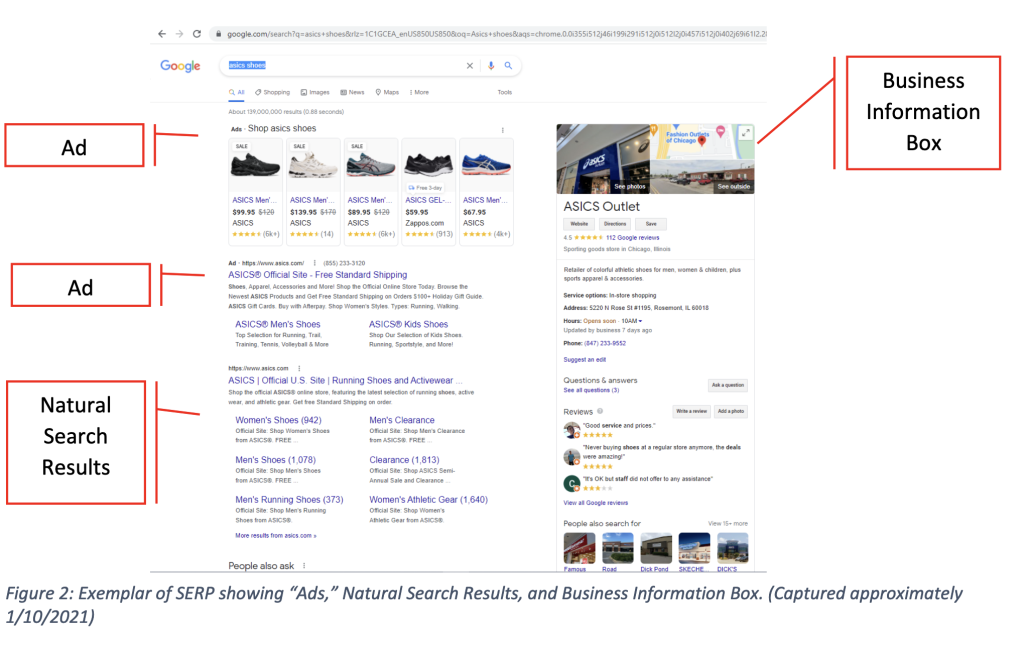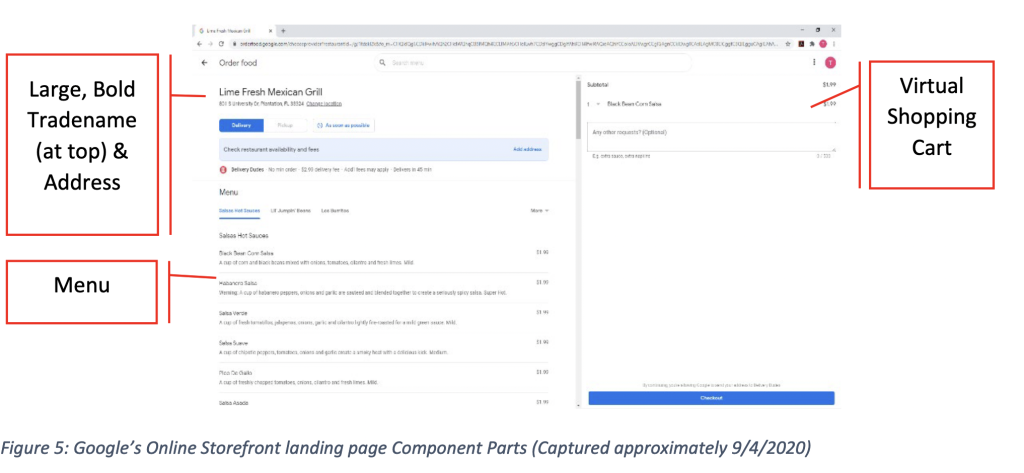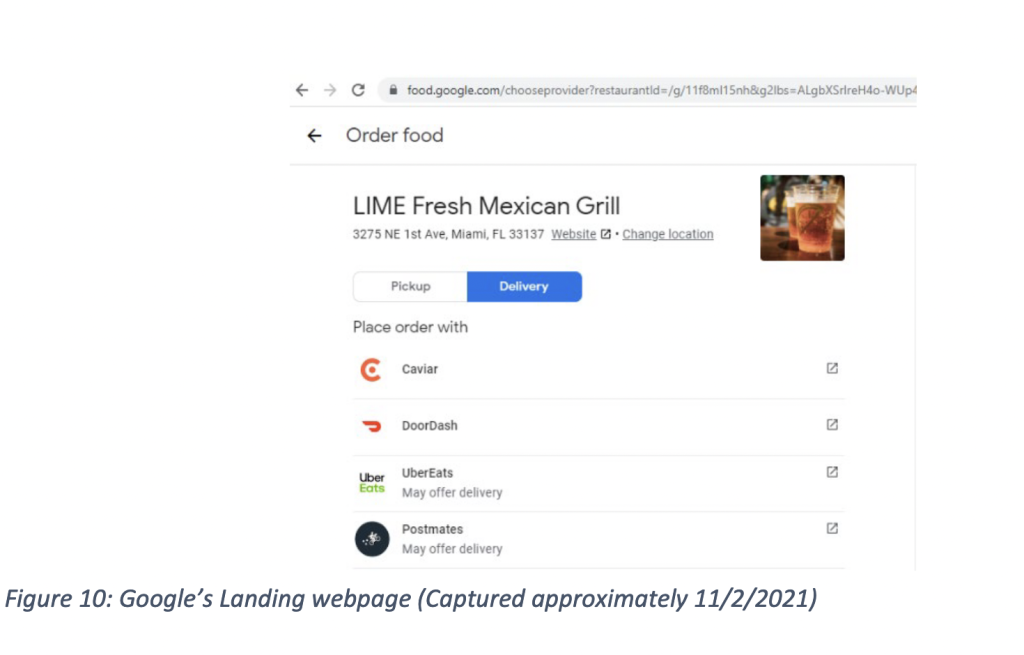“Beginning in 2019, when a consumer searched for a particular restaurant using Google’s search engine and/or mapping interface, Google began intentionally misdirecting the consumer away from the restaurant’s own website, physical address, and phone number, and into one of two different websites owned and controlled by Google.” – Complaint
 The operators of a number of Lime Fresh Mexican Grill franchises have filed a lawsuit in the Northern District of California on behalf of a nationwide class of restaurants claiming that Google, LLC has engaged in deceptive practices and misappropriation of their goodwill and tradenames by directing consumers to Google-operated pages for online ordering and delivery.
The operators of a number of Lime Fresh Mexican Grill franchises have filed a lawsuit in the Northern District of California on behalf of a nationwide class of restaurants claiming that Google, LLC has engaged in deceptive practices and misappropriation of their goodwill and tradenames by directing consumers to Google-operated pages for online ordering and delivery.
The complaint explains that Google changed the way it displays restaurant search results in 2019, confusing customers into ordering through Google-designed ordering buttons and pages, thereby robbing the restaurants of direct online orders. Instead, customers are fooled into ordering through delivery service providers Google has contracted with, which charge exorbitant fees to the restaurants, says the complaint.
As an example, the complaint explains that the delivery provider, Postmates, now owned by Uber Eats, charges contracting restaurants between 6% and 30% of each order. The sole motivation for restaurants to work with these services is to capture new customers who might eventually order directly from the restaurants. But in 2019, “Google began intentionally misdirecting the consumer away from the restaurant’s own website, physical address, and phone number, and into one of two different websites owned and controlled by Google,” says the complaint. “These websites are deceptively branded as being offered, sponsored, or approved by Plaintiffs and class members, when, they are not.”

Google’s traditional search engine results page will display a “business information box” when a user is searching for a particular business. In 2019, Google began presenting that box with a large blue “Order Online” button directly below the restaurant’s trade name.
 This button was invented and designed by Google without approval from the restaurants and was designed to be “larger, brighter, and more visible than other buttons or links with the Restaurant Information Box,” says the complaint. Google does not disclose that the button is not affiliated with or approved by the restaurants.
This button was invented and designed by Google without approval from the restaurants and was designed to be “larger, brighter, and more visible than other buttons or links with the Restaurant Information Box,” says the complaint. Google does not disclose that the button is not affiliated with or approved by the restaurants.
The Order Online button directs consumers to one of two different webpages, each of which are labeled with the restaurants’ tradenames without their approval, in violation of Section 43(a) of the Lanham Act. The first is an online “storefront,” where customers can order online via contracting delivery service providers and must use Google Pay to place their order.

The second webpage customers may be directed to is Google’s landing page, which displays the restaurant’s information followed by a listing of deliver service providers to choose form for ordering.
 While Google claims to have a right to use the restaurants’ tradenames “because of a purported transfer or delegation of such a right by and through its relationship with Delivery Providers to whom it passes its illicit orders,” the providers “are not authorized to create websites branded as the restaurant outside of the Delivery Providers proprietary platforms; and they do not have rights, in all events, that can be extended to third parties, such as Google,” says the complaint.
While Google claims to have a right to use the restaurants’ tradenames “because of a purported transfer or delegation of such a right by and through its relationship with Delivery Providers to whom it passes its illicit orders,” the providers “are not authorized to create websites branded as the restaurant outside of the Delivery Providers proprietary platforms; and they do not have rights, in all events, that can be extended to third parties, such as Google,” says the complaint.
The restaurants are seeking monetary and injunctive relief, including class members’ damages and Google’s profits, enhanced up to three times actual damages.
Keller Lenkner Partner Jason A. Zweig, who is representing the plaintiffs, said in a statement that Google’s practices are a threat to an already struggling industry. “The restaurant industry has already been gutted by the COVID-19 pandemic. Online orders have served as a lifeline to help them reach customers, make a slim profit, and continue employing their staff members. It is appalling that Google would take advantage of an industry going through such a challenging time and, through these deceptive and illegal practices, take a portion of their hard-earned profits for itself.”
Image Source: Deposit Photos
Photography ID:13438440
Copyright:guynamedjames

![[IPWatchdog Logo]](https://ipwatchdog.com/wp-content/themes/IPWatchdog%20-%202023/assets/images/temp/logo-small@2x.png)

![[Advertisement]](https://ipwatchdog.com/wp-content/uploads/2024/04/Patent-Litigation-Masters-2024-sidebar-early-bird-ends-Apr-21-last-chance-700x500-1.jpg)

![[Advertisement]](https://ipwatchdog.com/wp-content/uploads/2021/12/WEBINAR-336-x-280-px.png)
![[Advertisement]](https://ipwatchdog.com/wp-content/uploads/2021/12/2021-Patent-Practice-on-Demand-recorded-Feb-2021-336-x-280.jpg)
![[Advertisement]](https://ipwatchdog.com/wp-content/uploads/2021/12/Ad-4-The-Invent-Patent-System™.png)







Join the Discussion
2 comments so far.
Harold Young
March 9, 2022 03:33 pmIt may be a coincidence, but it is also getting harder to distinguish hotel websites from those operated by room booking services on Google. The room booking service charges for booking a room that could be booked directly with the hotel, which you only realize after the room is booked.
Pro Say
March 9, 2022 12:12 pm“Do no evil.” (unless doing so makes us $$$)
— Google.